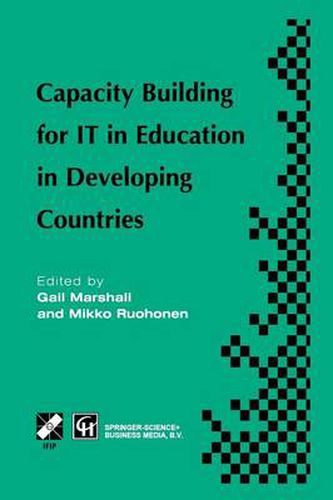Readings Newsletter
Become a Readings Member to make your shopping experience even easier.
Sign in or sign up for free!
You’re not far away from qualifying for FREE standard shipping within Australia
You’ve qualified for FREE standard shipping within Australia
The cart is loading…






This title is printed to order. This book may have been self-published. If so, we cannot guarantee the quality of the content. In the main most books will have gone through the editing process however some may not. We therefore suggest that you be aware of this before ordering this book. If in doubt check either the author or publisher’s details as we are unable to accept any returns unless they are faulty. Please contact us if you have any questions.
Deryn Watson CapBIT 97, Capacity Building for Information Technologies in Education in Developing Countries, from which this publication derives, was an invited IFIP working conference sponsored by Working Groups in secondary (WG 3. 1), elementary (WG 3. 5), and vocational and professional (WG 3. 4) education under the auspices ofIFIP Technical Committee for Education (TC3). The conference was held in Harare, Zimbabwe 25th - 29th August 1997. CapBIT ‘97 was the first time that the IFIP Technical Committee for Education had held a conference in a developing country. When the Computer Society of Zimbabwe offered to host the event, we determined that the location and conference topic reflect the importance of issues facing countries at all stages of developmen- especially Information Technologies (IT) development. Information Technologies have become, within a short time, one of the basic building blocks of modem industrial society. Understanding IT, and mastering basic skills and concepts of IT, are now regarded as part of the core education of all people around the world, alongside reading and writing. IT now permeates the business environment and underpins the success of modem corporations as well as providing government with cost-effective civil service systems. At the same time, the tools and technologies of IT are of value in the process of learning, and in the organisation and management of learning institutions.
$9.00 standard shipping within Australia
FREE standard shipping within Australia for orders over $100.00
Express & International shipping calculated at checkout
Stock availability can be subject to change without notice. We recommend calling the shop or contacting our online team to check availability of low stock items. Please see our Shopping Online page for more details.
This title is printed to order. This book may have been self-published. If so, we cannot guarantee the quality of the content. In the main most books will have gone through the editing process however some may not. We therefore suggest that you be aware of this before ordering this book. If in doubt check either the author or publisher’s details as we are unable to accept any returns unless they are faulty. Please contact us if you have any questions.
Deryn Watson CapBIT 97, Capacity Building for Information Technologies in Education in Developing Countries, from which this publication derives, was an invited IFIP working conference sponsored by Working Groups in secondary (WG 3. 1), elementary (WG 3. 5), and vocational and professional (WG 3. 4) education under the auspices ofIFIP Technical Committee for Education (TC3). The conference was held in Harare, Zimbabwe 25th - 29th August 1997. CapBIT ‘97 was the first time that the IFIP Technical Committee for Education had held a conference in a developing country. When the Computer Society of Zimbabwe offered to host the event, we determined that the location and conference topic reflect the importance of issues facing countries at all stages of developmen- especially Information Technologies (IT) development. Information Technologies have become, within a short time, one of the basic building blocks of modem industrial society. Understanding IT, and mastering basic skills and concepts of IT, are now regarded as part of the core education of all people around the world, alongside reading and writing. IT now permeates the business environment and underpins the success of modem corporations as well as providing government with cost-effective civil service systems. At the same time, the tools and technologies of IT are of value in the process of learning, and in the organisation and management of learning institutions.